BRENNA TUATS TOUR 2012
The groove of the mountains
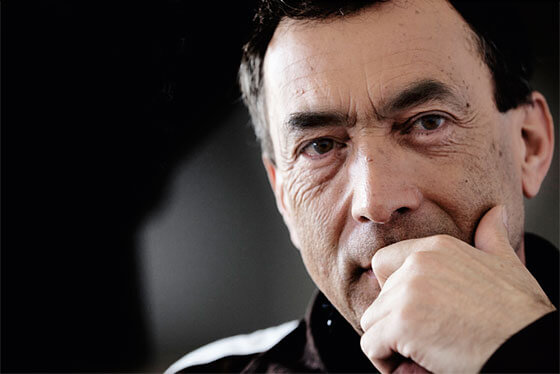
Hubert von Goisern is a thoughtful person. When cornered, he formulates his answer quickly and precisely and it turns into an academic pleasure. Outside, with sold-out concerts throughout the year, he is more than ever a natural phenomenon. Fantasies are invoked to categorise him: alpine rocker (okay, says Goisern), folk music rebel (that's fine too), music guerilla (to a certain degree), rock philosopher (uh, I'm not a leather jacket kind of guy), Tom Waits in lederhosen (please no). We sort out a few nuances.
Your audience is getting younger and younger, certainly at concerts and probably in the record shops too. Do you find that refreshing?
This mix is super, as far as age is concerned and social background too. People come together who otherwise wouldn't meet on the street or anywhere else. They then unite at my concerts. I really like that it's not just one segment, where everyone's dressed and done up the same.
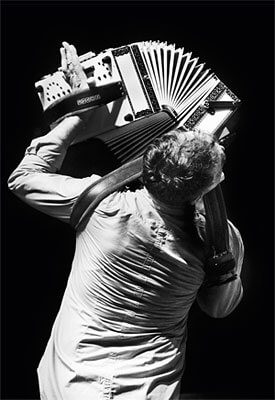 This isn't meant to degenerate into a review of the record (new: Entwederundoder) or concert, but if we pick a few individual numbers apart a little, the end effect should be coming to the breadth of the current Goisern-cosmos, apart from the hardcore fans who have every song in their heads anyway. Okay?
This isn't meant to degenerate into a review of the record (new: Entwederundoder) or concert, but if we pick a few individual numbers apart a little, the end effect should be coming to the breadth of the current Goisern-cosmos, apart from the hardcore fans who have every song in their heads anyway. Okay?
Let's try it.
An Indian song has been long due, at last the alpine region is attending to the Apaches and Comanches. As a child were you more of a trapper or an Indian?
Well, there are people who split mankind into cowboys and Indians. These distinctions aren't my thing, there are very, very many grey areas in between. But I was of course an Indian. They stand in opposition to the colonialists, who take everything with firepower. Indians are nomads who migrate over the years. Free spirits from our point of view.
Heidi is a number that is called yodel rock. YODEL ROCK?
(Defiantly:) It's a rocky reggae waltz.
Fine. It is any case a pastiche of life in the mountains and the sense of kitsch with which it is conducted. The number is fantastical, you'd expect it to be played nonstop on the radio.
I think it's a really lovely melody on the accordion, which has turned out well. Not so many people get the "aberration" - the day and night - of this song.
Brenna tuats guat – is that the new anthem for the Goisern community?
Well, I don't know about anthem. It was top of the charts for a long time and is played a lot in the discos.
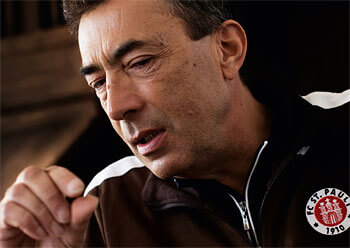 What's that down to: the groove, or the message?
What's that down to: the groove, or the message?
I think both have equal value. The song wouldn't have reached where it is with the groove alone. I'm speaking the mind of many with what I sing. It's what the people are thinking and feeling and somebody is expressing it in the form of a song. It has something to do with groove and the alpine way of playing music, which is simply in it and also the connected power in it that breaks free. It's not a critique of a society that's foaming at the mouth, but actually a very exciting form of portraying something really laughable - like the burning of food, or the processing of food into fuel. But it doesn't come over so "we mustn't, we shouldn't" - but is rather a statement of fact. That goes down much better.
A concert encore of Hiatamadl – let us now say - makes people very happy. Come autumn two people have round birthdays: Goisern will be sixty, the Hiatamadl will be twenty. You yourself haven't put up with the hype of being reduced to Hiatamadl too often. Have you now made your peace with thin and thick calves?
We don't play it every evening. It's one of the numbers that needs to be right for me, because it's hard to sing it - you really have to go full on with this song. You can't play it at the start of a set, it has to be one of the last songs. Then I often get the feeling that I can no longer sing it the way I want. When I really overexert myself I then need at least one day off afterwards. Hiatamadl also hasn't suited all the lineups of past years. Now, with the really rocking formation in this clarity - now it fits again.
It is noticeable that a notorious globetrotter doesn't weave the folklore of the places he visits into his music. Yet time and again Goisern disappears for long periods into exotic climes.
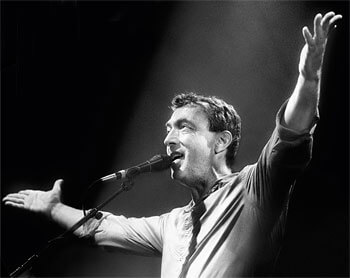 You don't necessarily have to spread curry sauce over your schnitzel to live out this global village thinking. On the contrary, when I arrive somewhere, I look for the authentic. I don't want to contribute to things being blurred and mixed up. It's different when we play somewhere abroad. We had African musicians on stage in Mali, Bulgarian gypsies were on stage at the Danube estuary, wonderful. But I don't import this experiences into my compositions, except perhaps sometimes subconsciously.
You don't necessarily have to spread curry sauce over your schnitzel to live out this global village thinking. On the contrary, when I arrive somewhere, I look for the authentic. I don't want to contribute to things being blurred and mixed up. It's different when we play somewhere abroad. We had African musicians on stage in Mali, Bulgarian gypsies were on stage at the Danube estuary, wonderful. But I don't import this experiences into my compositions, except perhaps sometimes subconsciously.
There is this muscleman that stamps across stage and maltreats the accordion with musical fury. This muscleman hasn't changed, over time he's become neither fatter, greyer, slower or quieter. Have you been spared the experiences of getting older?
No, of course I notice it here and there, but what bothers me most is the loss of naïvety. There's now this feeling of knowing how the world works, being able to predict the consequences of actions - which is often not the case. But you think that you can conclude from experience: if I do that, that will happen. That's what I mean by the loss of naïvety. It constrains me more in that I can't do a long mountain hike from a standing start without preparing myself. And I'm not a preparer. I don't like practising my instruments, except when I want to play, I want to play and then I'm surprised that I've got bloody hands, because my fingertips can't take it.
So the strength and condition come simply from playing, or does it need an additional programme?
The strength comes from playing and in mountain climbing it also comes from the joy of simply going up the mountain.
Will the mountain always remain a centre point of the Goisern geography?
Yes, certainly. Being able to go up without looking up, being able to leave the the earthly things behind with practically every step you take up and then looking down and everything is very small - you can't see the people, the houses are small, you can only hear the cars - that's something that I'd be reluctant to do without. I like the sea too. I like the desert as well. But mountains, when I have those, I feel at home - no matter whether they are in the Himalaya, East Greenland or the Salzkammergut.
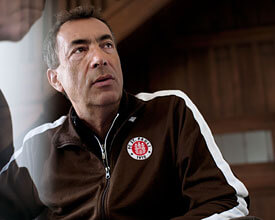 You are a political person, but you don't write political music.
You are a political person, but you don't write political music.
Politics is politics. I think everyone living in society lives a political life, because living together is only possible when ones practises thoughtfulness and solidarity. This includes thinking about how collaboration can work, or what is no good for collaboration. For me music is something much greater that politics can ever be. When you politicise music you make it smaller - you reduce it. It would be better to make politics more musical.
A very clear Goisern cultural contribution is the ability to drive the chauvinism out of tradition a little, or at least to repress it. The two terms used to be almost conterminous. Now there are fresh chances to resolve this.
If that's how it is seen, then that makes me happy. For me, it's about dissolution and not demarcation. Tradition always has something rather to do with demarcation, that starts there and ends there. I like making holes in it, throwing open windows and doors, or sometimes blowing them open, without letting things turn into an all purpose mush. That's the fear that many traditionalists have.
Following the huge concert tour this year, you'll be taking a two-year break, writing an opera and a novel. Correct?
Both are subjects of interest, correct. But we'll see what music wants from me in the meantime, and what I want from it.
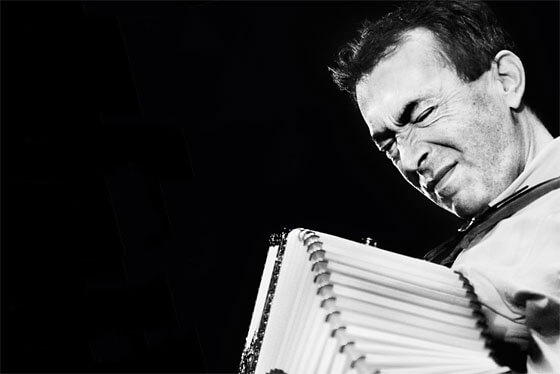
A man who opens windows
At almost 60 years old, Hubert von Goisern has reinvented himself once more. He talks to FURCHE about
the feeling
of not knowing what will happen next, his catalogue of ideas and yodelling in Greenland.
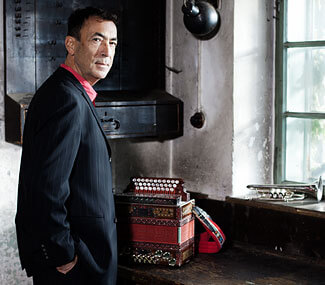 Hubert von Goisern has been a benchmark figure in the Austrian music landscape for decades. Yet it wasn't until last autumn that he landed a number one hit with Brenna tuat's guat. Since then he has been touring tirelessly through the German-speaking region. Nonetheless he found time for an interview with the FURCHE.
Hubert von Goisern has been a benchmark figure in the Austrian music landscape for decades. Yet it wasn't until last autumn that he landed a number one hit with Brenna tuat's guat. Since then he has been touring tirelessly through the German-speaking region. Nonetheless he found time for an interview with the FURCHE.
You took a break from touring before Easter and spent a week in Greenland. Why?
There's a man from South Tyrol in East Greenland, Robert Peroni. He runs a guesthouse there, which also acts as a kind of rescue house for young people who have lost their perspective on life. And there are many there. The life their forefathers led as hunters is not an option for them and there's not anything new. The young people are being suprooted more and more and the suicide rate is very high. I was sceptical at first when it was suggested that I could run a musical project there. I'm not a social worker. But when someone asks you to consider such a thing, I can't turn it down. So that's why I was there last September and again before Easter.
To play music with children?
Yes, and we listened to a lot of music together. I have a big collection of Greenlandic music, which I took with me, along with traditional music from every possible cultural sphere. There's almost no traditional music in Greenland any more. Only Danish and Anglo-American pop music and a few church songs, that are sung in the East Greenlandic language, but which do not originate from there. When I then played the young adults the songs that their grandparents sang, you could see how the music was entering them. They moved to it, sometimes knowing whose ancestors from which town were singing the song, though they had never heard it before. And for those who want to play creative music themselves, I can offer them my experience. When composing you always have to draw on something, you can't reinvent the wheel with every song. You need sources from which to draw, everything comes from a tradition. It's a question of choice.
You revealed the source?
The contribution I can make is that they then tackle it. I gave music and singing lessons, in which I developed a yodel with the children, as an example from our tradition.
Did you manage it?
It was a lesson for me too! It reminded me that music is something different for each of us. When I sang an F and asked them to sing this note, I heard just about every frequency that's in the range of a child's voice. But there was no F. In that moment I actually wanted to say, let's forget it, that won't work. But faced with their shining eyes, I didn't have the heart. It took a lot of strength and almost as much faith. Perhaps the appeal to Saint Rita, who makes the impossible possible, helped too. In the end though, with a bit of imagination, you could hear the melody. When I played them Hiatamadl at the end, they sang along quite wonderfully and intuitively during the yodel passage. I want to go back in January. I'm curious to see what remain by then.
Travel is one of the great themes of your life. What about it do you find so fascinating?
The break. When you travel somewhere you've never been before, you need to be completely awake. You can't take anything for granted. I like that.
You completely leave your comfort zone. That would be worrisome for a lot of people.
It can be very stressful for me too. I ask myself: why are you doing this? Then I long for comfort and a door I can shut behind me, or a kettle so I can make myself a cup of tea. But it's fine without that too. And you need to have patience and see what happens. That's what I look for. If there's something I'm afraid of, it's routine.
Nonetheless you have returned from being abroad again and again ...
... before routine breaks it down.
Is homeland, this one place of "home" important to you?
Yes. And that's the reason I can keep going on journeys. Because there is this place of which I can dream when I'm having a hard time.
And tradition?
Tradition creates a feeling of belonging, but it also excludes other things. When I go to the Tuaregs, or the Samis, or the Goiserers and they withdraw to this "we are who we are and it's always been this way", that's too little for me. The balancing act between tradition and openness is a gymnastic exercise, it keeps the mind agile. I don't like manifestos, walls. I look for the windows and open them. I look to see where the wall is crumbling and make the hole bigger so it goes all the way through.
Has a "normal" life with an office job, dog and terraced house always been out of the question for you?
I have tried to carry out a normal job, I trained as a chemistry laboratory assistant, but I was hopeless. During my apprenticeship I set fire to the laboratory twice and flooded it once, I was a disaster. Then I realised that it wasn't the right thing. I'm happy that I found music, because it's a job, a vocation, that doesn't feel like work to me.
But the element of scandal has remained.
That's an expectation and something that I want to abolish. This feeling of rebellion belongs rather more to the younger years. You should keep it to a certain degree, but with age should also come a bit of wisdom and composure. And an understanding and empathy for people who mean well, but don't do well. In my experience, there are only very few people who are a priori bad. Most simply don't know what they're doing.
This mindfulness and solidarity, about which you also always sing, is it something that someone can learn?
I think so. I had to put myself in this feeling of exposure that comes from not knowing what will happen next. If you don't know how you're going to pay the rent next month, can boast no success, you become very thin-skinned. Then you gain an awareness and an understanding for things that are beyond the material.
You are able to boast of successes: two Amadeus Awards, double platinum for the new album, a sold out tour ...
For me success is managing to put an idea into action. Ideas always come. You just have to be sensitive enough to perceive them. Then putting them into action is something else again. That can be arduous too. If it comes off and works, that's a great gift.
Have you had many ideas that haven't panned out?
I haven't actually. But I have a few ideas in my catalogue that I haven't yet put into action.
Hubert von Goisern: "Money is just a tool"
Bielefeld. In spirited Austrian dialect Hubert von Goisern sings the current album EntwederUndOder, which was at the top of the charts for a long time . But it's not about quaint cosiness: the alpine rocker rebels against this. On 13th March he's coming to the Ringlokschuppen. Nico Buchholz talked to him about criticism of capitalism, dialects and pigeonholed thinking.
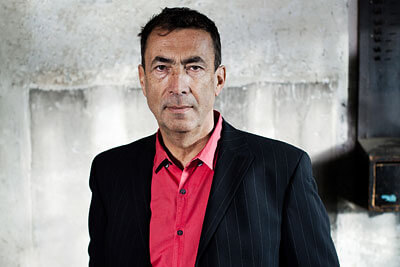 Mr von Goisern, do you think that there are many people in North Germany who don't understand your lyrics because of the Austrian dialect?
Mr von Goisern, do you think that there are many people in North Germany who don't understand your lyrics because of the Austrian dialect?
I can imagine that would be the case. But it's within limits if you engage with it a bit. It is still German. You have to let yourself into the sound of the language, which of course takes practice. Then it's not far off.
So you have to hear it more often?
Yes, and it helps to read the lyrics.
How important is it to you that your audience understands the lyrics?
It's important to me that lyrics transport stories that are worth telling. Whether everyone understands exactly what I mean is another matter. Just because you have mastered a language doesn't mean that you hear what the author thought. That is the freedom of the listener. First and foremost I feel myself to be a musician. Music has a magic that goes beyond language, that expresses something where words fail. That's the primary means of transport.
In Austrian your hit Brenna tuats guat went to number one. In Germany it wasn't so successful. Is that down to people understanding the lyrics better in your homeland?
I think that the whole song, not just the language, but the style too, is very Austrian. It touches a nerve there more than in the north. It was often played on the radio in Bavaria too. It has a different status there compared to North Rhine-Westphalia.
Alpine rock, blues, folk music – how would you describe the music on the current album EntwederUndOder?
I don't pigeonhole myself. If I have to be reduced to one term, then it's the name under which I perform, "Hubert von Goisern". I've made my own pigeonhole. And even that I have to break open again and again so as to avoid the feeling of mustiness.
You have become acquainted with many musical influences with journeys around the world. Are these reflected in the album?
Much of that with which I was musically socialised is to be heard. Blues played an important role. The discovery of this harmonious and formal structure in which you can include your personal feeling of life threw open a window for me. I grew up with a curiosity for traditions that were different from ours. I never had the feeling that the tradition into which I had by chance been born, would be more important than any other. But it shaped me and is a part of my world and thus a part of my creativity.
What does the success of your first number one hit mean to you?
It is a sign of approval, but it's not something towards which I worked. My music was often played on the radio at the beginning of the 90s, back then it was the song Hiatamadl. I have the feeling that I've been swimming at the top since then. That it was expressed again, in that I took number one, is good for my entourage and for my band. I'm happy for them. My personal number one for the Linz Europe Tour. That has an incomparably higher value compared to being in the charts for a few weeks.
On that tour from 2007 to 2009 you sailed ships on European rivers and gave concerts. What was special about it for you?
It was a vision of bringing people together with music and taking down borders. When Europe expanded eastward, the move of the boundary was only on paper. It didn't happen in people's heads. I wanted to make a personal contribution to the dissolution of boundaries and getting to know one another. We showed that it's possible to make dreams come true.
In Brenna tuats guat it is said that you can't eat money, but it burns well. A critique of capitalism?
It is fact that almost everything revolves around money. But money is only a tool. It's like the carpenter only working with the plane, or the writer only with a pencil or laptop. They are only tools. But money has been raised up the flagpole. That's abnormal. No matter how much money you have: you can't buy the essential things. If you want to read a book, you have to read it yourself. You can pay a lot of people to read it for you, but you won't have read it yourself. If you want to go up a mountain, you can have yourself flown up there in a helicopter. But you know when you get out of the helicopter: it's not the same as if you'd climbed the mountain. At this point I think it can't get any worse. I wouldn't call myself an angry citizen, one who vent's his spleen, but unhappiness with politics is a subject. This stupidity of converting food into fuel, although we know that thousands of people are dying from hunger every day, is just absurd. It is this consternation that I put into the lyrics.
How political are the other songs of the albums?
I'm a political person, but I don't write political music. I don't see any of my songs as political songs. When I write lyrics, it's important to me that images and feelings develop in the minds of the listeners.
The exorcist of folk music
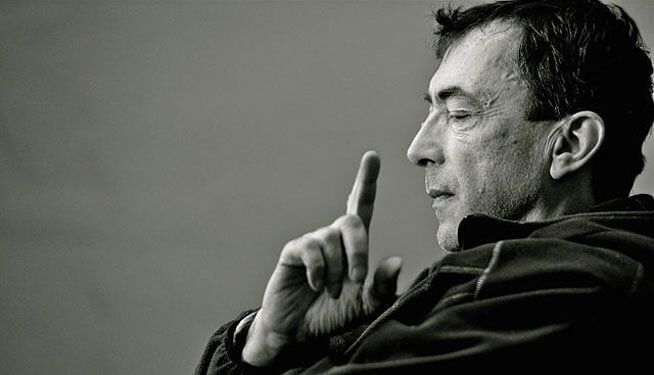
Hubert von Goisern - at nearly 60 years old he wrote "Brenna tuats guat".
The anthem of the angry citizen became his first number one.
On 12th October 2008, the day after Jörg Haider's death, Hubert von Goisern was sat alone in a hotel room in Dresden. "So I'll never meet him," was his first thought. And suddenly despite the antipathy, there was also the feeling of having missed out on something: the personal showdown with a piece of homeland.
Hubert von Goisern, real name Hubert Achleitner, never met the leader of the Freedom Party, who was just three years older than him, although his grandfather and Haider's father were close and like-minded friends at home in Bad Goisern.
A town with 75000 inhabitants and two walking emblems: one the radical right-wing populist and the other the liberal globetrotter. Two who always tilled one field: tradition.
"I tried to clear away the rubbish, tear open the crusty clods of earth and plough," says Goisern in the News interview of his efforts to renew punch marked folk music. "But I've broken free now".
Broken free from the cliché of just being Haider's musical antipode. But broken free from being reduced to just his first hit Hiatamadl too, under which Goisern suffered for years.
Consequently, he expelled from the hall the section of the audience that only wanted to party and not listen. Often preferring to play in Germany where they paid court to him as a rustic underground poet, not as a welcome source to whom they could bawl along, as here in Austria.
Fire, gold and platinum. Goisern turned to international projects, sailed a barracks ship and concert stage first from Linz to the Black Sea, then from Linz to the North Sea, playing on river banks and in harbours with high-class guest musicians such as Xavier Naidoo, BAP or Konstantin Wecker. Homeland, that was no longer just Austria for Goisern, but instead anywhere where he gets involved and talks to people."
In the second half of last year he then reported back to his home country. And how: his protest song criticising capitalism, Brenna tuats guat, became the anthem of the angry citizen - and the first number one for the almost 60-year-old. The number held its own in the charts for ten weeks, five of them at the top. The accompanying album was awarded gold and platinum.
Goisern is a mass phenomenon again, his hit has landed on aprés ski compilations between Peter Wackel (Joana, du geile) and DJ Ötzi (Ring the Bell). In earlier times Goisern threw out the bawling singers. Now he's evacuated them to the ski chalets.
The big interview about new and old folk music, thudding sounds and nationalistic Goisern fans.
Mr Goisern, Mr von Goisern, Mr Achleitner, what's the right way to address you?
That depends. Mr Goisern sounds strange, Mr von Goisern sounds even stranger. Achleitner, there is a familiarity in that for me, a note of privacy. Goisern is a part of Hubert Achleitner, but not the other way around, or there'd be a danger of schizophrenia. It's good for me that there is this difference.
In order that you don't break under the cynicism of the pop biz?
I'm not in the pop business, I'm a musician and see that as a job. And - music is not cynical, it's good or not good.
Alpine rocker, folk music rebel, Tom Waits in lederhosen - the circulating Goisern clichés don't annoy you at all?
15, 20 years ago for many people I was the traditional guy from the mountains who played the accordion. But those are not my classifications, they are other people's. Back then lots of people came to my concerts because they had heard Hiatamadl on the radio and were then perturbed that other things were happening. Lots of them came just to have a party, I was there to give a proper concert. Those are two very different animals and I had to teach them that. After the second or third number I said: "Go out to your car, listen to Ö3, they're probably playing Hiatamadl, it will be played here in 55 minutes." I've now achieved a different status and broken free from clichés.
Abend spät was one of Hitler's favourite songs. You re-interpreted it - is music completely unpolitical?
Music is a priori unpolitical and innocent. The moment it becomes politicised it loses power and magic. What I do is more of an exorcism. It's a wonderful, great song and I can't say: just because a villain liked it, it should be taboo for everyone else.
In an interview with the FAZ you said that twenty per cent of your audience came from the right wing. Does someone who builds on tradition need to accept being misunderstood or misused?
First of all, I'm please about everyone who hears my music, even those who download it illegally from the net. Secondly: yes, there is a corner in which I don't see myself, but which most likely has a connection to me. I think it's exciting when people who would otherwise hate each other's guts listen to the same music for two hours. Having to wash before you come into my holy halls - I don't want anything like that! As soon as my music goes out I want neither to take care of it any more, nor be its political regulator. I see politics as basically necessary, but party politics is something that divides people. These grave diggers are repulsive to me.
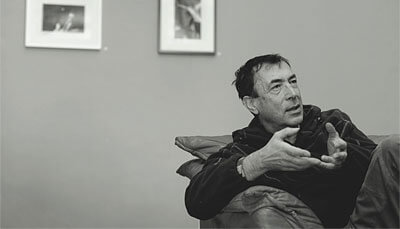 Grave diggers?
Grave diggers?
Strache is one such grave digger.
You didn't think he was as dangerous as Haider.
I still think that, he doesn't have the same calibre. Nonetheless, something Karl Kraus said is appropriate for him: "when the cultural sun is shining low, even dwarves cast long shadows". And the shadow that Strache casts is a pretty powerful one.
Haider also came from your hometown of Goisern, his father and your grandfather were good friends. What went through your mind when you learned of Haider's death?
I thought: now I'll never meet him. The late News journalist Peter Leopold once asked me if I'd be prepared to do a round table with him. I thought, that's something I really don't need. But I accepted, because I didn't want chicken out. But then it was: "Haider has cancelled. If you're going to be there, then he's not coming." I thought to myself: "Aha, he's worried, much more worried than me. And I knew why: too many people who voted for him like my music too. And if he takes me on, the danger of losing them would be too great. Nonetheless, I would have liked to have met him one time.
Haider's father, your grandfather - how disturbing was this right-wing milieu?
Nobody but my grandfather on my mother's side had this ideology. And he wasn't staunch, it was more obscure. Except at my grandfather's birthday parties, to which Haider's father was also invited. Those were the moments where as a youth you would have liked to have known what happened in the war, but it was taboo at that time. At the age of 16, 17 I brought up this painful subject - which was clearly unpleasant for my grandfather, but Haider senior laughed in my face and said that history will show the Nazis to have been right. Nonetheless, I don't want to judge my grandfather, may he rest in peace, he was a warm person and badly scarred by the world wars and the expulsion of his family from the Sudetenland. But polluted by racism.
Your father was a member of the SPÖ, your uncle a red councilman. How do you get on with today's left wing?
How is it for me? Not good. I've never understood SPÖ agendas such as letting go of the Foreign Office. Of course in a coalition you need to give your partner room to manoeuvre, but basically for me it's a pathetic display, giving up the core ministries. Where's the solidarity with those who stood for the left? Austria is a great country, a rich land. So I'm all the more bewildered that in a city as rich as Salzburg, there are as many as 100 homeless youths. Politics must make these cuts - if they have to by raising taxes for the rich, which certainly includes me.
Back then, at home in Goisern, what was your first really forming musical experience?
In my childhood we had Österreich Regional playing, operetta-like things stuck, Lehar melodies, Fritz Wunderlich. When I was 12 then there was a real thudding sound - Chuck Berry's Rock 'n' Roll Music, played by the Beatles! I was sat there with my soup and suddenly there was this: da-da-da-da! The spoon fell out of my hand, I completely froze. My father said: "It sounds as if the record's stuck." That's when I knew that was my thing. Also because he couldn't get on with it. Because it was my world.
You come originally from brass music - do you learn anything about life there?
My parents didn't have the money to buy me an instrument. When I was twelve I went to the brass band and said that I'd like to play the trumpet. It was an instrument I liked, so bright and shiny and loud. They assigned me a teacher, to whom I am still unbelievably grateful today. It didn't cost anything, he was simply the first trumpet in the band. I was a lazy dog, I wanted to be a musician, not become a musician and I never practised - but he was never cross with me. But then there were disputes within the band. There was always grouching about how I should get my long hair cut - which led to me grouching back. About the fact that they always played the same thing and never added anything new to the repertoire in order to keep things easy.
If you hadn't been thrown out, what would have become of you?
Thank God the moment of realisation came, otherwise maybe I'd be the band leader today. Or I would have despaired and would have completely given up music. But when they threw me out, the world fell apart for me.
On the one hand you need harmony and on the other you're an unconventional thinker - is that a dilemma?
Yes, you could say so.
The first number one at the age of nearly 60 - how does that feel at an age at which others are thinking about retirement?
If there are some early retirees thinking that maybe they should do some more work, then it's a nice effect. But my own very personal real number one was the Linz Europe Tour - the fact that it came off is such a great feeling, such a validation. Five weeks at number is indeed a wonderful reward, but I never worked for it.
How do you explain your current charts success?
I"m not telling society anything new with Brenna tuats guat, but rather am speaking their mind. It runs across dialect and language. Both are unmistakably Austrian and have a good groove.
Can music give you a homeland?
Certainly, there is an acoustic homeland, which includes the sounds that surround us - for me that's everywhere I get involved, talk, shape. If I'm just watching, it'll never be home.
How do you perceive homeland?
Homeland can enchant me, but give me the creeps too. Homeland can be the familiar creep too.
How can tradition be freed from creepy chauvinism?
I know that it is very, very difficult. When I think about homeland, I immediately think of my journeys to Timbuktu, to the Tuaregs, or to Lappland, to the Samis, who all express a very strong identity with their songs, singing and clothing. If you're not one of them, you dimply don't belong, you're a stranger. I don't like the idea of having to dress the same and wear the same hat in order to belong. There is something exclusive about tradition and that is oppressive. Even if it is something that gives people a sense of stability. When there's someone else outside, it gives those inside a comforting feeling of togetherness.
Bad Goisern, is that still home for you?
I have a handful of really good friends there. But there's also definitely another handful or two who can get on with me less well, but I get the feeling that I'm basically met with respect. There used to be people who got upset at my way of playing music - but they don't dare say anything any more. Society has become more open and you don't get this feeling of "nobody's listening if we say anything stupid" any more. Everyone hears everything. It makes it more difficult to talk drivel.
Aside from being usurped by the Nazis - what has hurt folk music the most?
Folksy schlager. I used to try to clear away the rubbish, tear open the crusty clods of earth and plough. I think in so doing that one or two seeds rose.
If you look at the harvest as a whole, how does it feel to have paved the way for people like Andreas Gabalier or DJ Ötzi?
I don't want to deny anyone the right to like Gabalier. No-one lasts long without substance. I am and remain a fan of biotopes and a declared opponent of monocultures - because they lead to the ground drying out again.
Goisern: Not just my "sweet side"
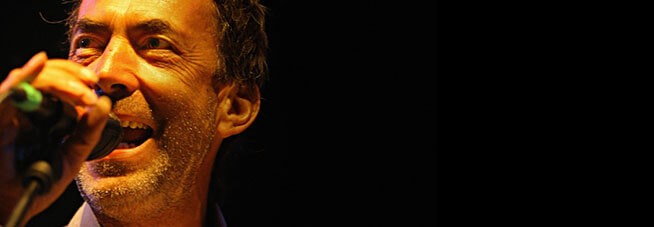
Hubert von Goisern on a tour of Austria with his successful album "Entwederundoder"
and the hit single "Brenna tuats guat".
"I'm not someone who has modest dreams. But not in my wildest dreams did I think of reaching the top of the charts."
For five weeks in autumn 2011 Hubert von Goisern stood at number one with the single Brenna tuats guat, something he hadn't managed even in 1992 with his breakthrough hit Koa Hiatamadl. The Upper Austrian, who didn't make the decision to become a musician until he was 27, is thus at the high point of his career at the age of 59. Entwederundoder, the album from which Brenna tuats guat was released, has sold more than 20,000 copies.
In December Goisern was awarded platinum for this record, a production that he sees as a direct reaction to his Danube tour. For this he had chartered a ship, sailing the Danube and Rhine from 2007 to 2009, playing concerts on the river banks with local musicians.
Intimate
"In order to give all these artists a forum, I held myself back a lot", he says in the KURIER interview. "From this came the desire to let the new songs be small, intimate and personal. Little mosaic tiles that as a complete picture show my personality."
Von Goisern is seldom political as in Brenna tuats guat. "I don't just show my sweet side, but as angry and aggressive too. There are a couple of numbers that are very in your face. In Suach da an andern or I versteh di nit, I'm telling other people very clearly what I'm thinking."
With a lot of humour, because "I'm a conciliatory person". Word play has a bigger role than before in the songs of Entwederundoder. "I'm not such a wit in everyday life. But the more serious the situation, the more humour I can display. And these songs are all such small, self-contained cosmoses that it comes more easily to me."
Blues, punk, pop
Von Goisern is just as diverse musically-speaking as he is with the subjects of his songs. There's blues and punk, pop, bar jazz and of course folk music. From 25th January Hubert von Goisern will be on tour in Austria with this mix and all his old hits. A concert trip he is particularly looking forward to after his chart success: "It's nice to have this recognition without having done anything differently from before."
